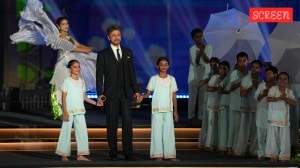In Sachar report, a glimmer of hope for Muslims in jobs: ‘BPOs are less prejudiced’
Tucked away in one paragraph on page 21 of the 404-page Sachar Committee report on the dismal presence of Muslims in virtually every sector is one finding that holds out a glimmer of hope...

Tucked away in one paragraph on page 21 of the 404-page Sachar Committee report on the dismal presence of Muslims in virtually every sector is one finding that holds out a glimmer of hope when it comes to Muslims in employment.
Business Process Outsourcing (BPOs), the heart of the services boom in the economy, the report says, has provided a window of opportunity “where, interestingly a large number of Muslims seem to find employment. It was found that the proficiency of English was the only criterion for gaining employment — sheer market forces were determining recruitment, rather than affiliations of any kind.”
Based on interviews and representations from a range of individuals and organisations from across the country, the panel found that in places where proficiency and a certain specified criteria need to be met and there is no room for a firewall to filter Muslims out, Muslims seem to have made it.
There is one caveat though: according to the report, this lack of bias “may be true for some of the larger companies…small or medium scale companies that dominate the private sector have not extended a level playing field to Muslims.”
This conclusion acquires added significance as the committee sees market forces unleashed by economic liberalisation as a double-edged factor. While, like in the case of BPOs, the market is seen as an invisible hand that doesn’t discriminate, the committee says that “Muslims have had to bear the brunt of so-called competitive forces unleashed by liberalisation… especially silk and sericulture, hand and power looms, leather industry, automobile repair and garment making” which have thrown a lot of Muslims in traditional occupations out of business.
Prejudice colours market forces when it comes to bank credit, too. Banks, both public and private, the report says, have marked Muslim concentration areas as “negative or red zones where they don’t give loans”, greatly hampering economic activity and sometimes simply survival.
Towards tackling this prejudice, the Sachar panel has proposed setting up of an Equal Opportunities Commission and a Monitoring Mechanism that ensures towards “fair representation” across communities in public bodies.
As a series of reports in The Indian Express have revealed, the severe under-representation of Muslims in employment — compared with their share in the population — isn’t confined to only the government. Although no detailed figures were sought from the private sector, the Sachar Report says that “Muslim presence in the private sector was found to be even more dismal.” Suggestion: it is important to “sensitise the private sector to go ahead with positive discrimination or affirmative action” to recruit Muslims more widely.
Significantly, the report delivers a damning verdict on both kinds of politics: on those who have peddled themselves as “saviours” of Muslims without delivering tangibles and those who have gone ahead with divisive politics that has resulted in insecurity, fear and a sense of siege and victimhood in the community. Admitting that not “all perceptions are correct, but they are also not built in a vaccum,” the report lists “Identity Related” concerns as the prime problem the community faces.
Muslims experience “the burden of being labeled as ‘anti-national’ and as being ‘appeased’ at the same time.” It says that Muslims agonise over needing to prove on “a daily basis that they are not anti-national and terrorists, it is not recognized that the alleged “appeasement” has not resulted in the desired level of socio-economic development of the Community.” It goes on to add that Muslims feel they are looked upon with a “great degree of suspicion not only by certain sections of society, but also by public institutions and governance structures.”
The report quotes Muslims as being “pained” at the “lackadaisical attitude of the government and the political mileage sought whenever communal riots occur.” It also says that in Muslim perception, “the police and the media overplay the involvement of Muslims in violent activities and underplay the role of other groups or organizations.”
While not naming Gujarat and the riots there in 2002, the report says that “violent communal conflicts especially like some recent ones in a state in which there is large-scale targeted sexual violence against Muslim women has a spread effect even in regions of the country not directly affected by the violence.” For, the feeling of vulnerability has an impact on Muslim mobility and education, especially that of girls’ education. This further results in Muslims seeking to ghettoize themselves, with “the migration away from where they have been living for centuries affecting employability and means of earning a livelihood.”




- 01
- 02
- 03
- 04
- 05



























